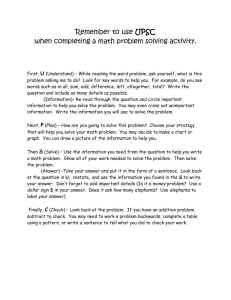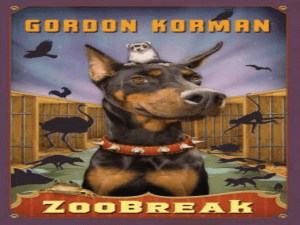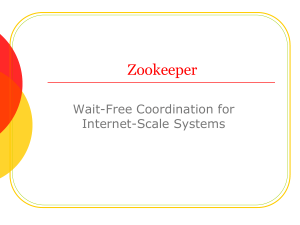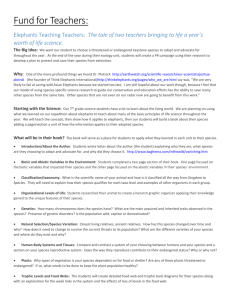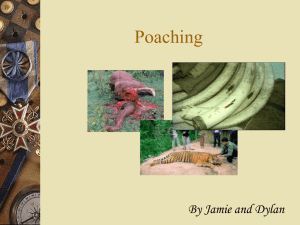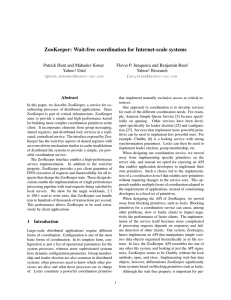Young Digital Planet 2014 – Core Curriculum for English
advertisement
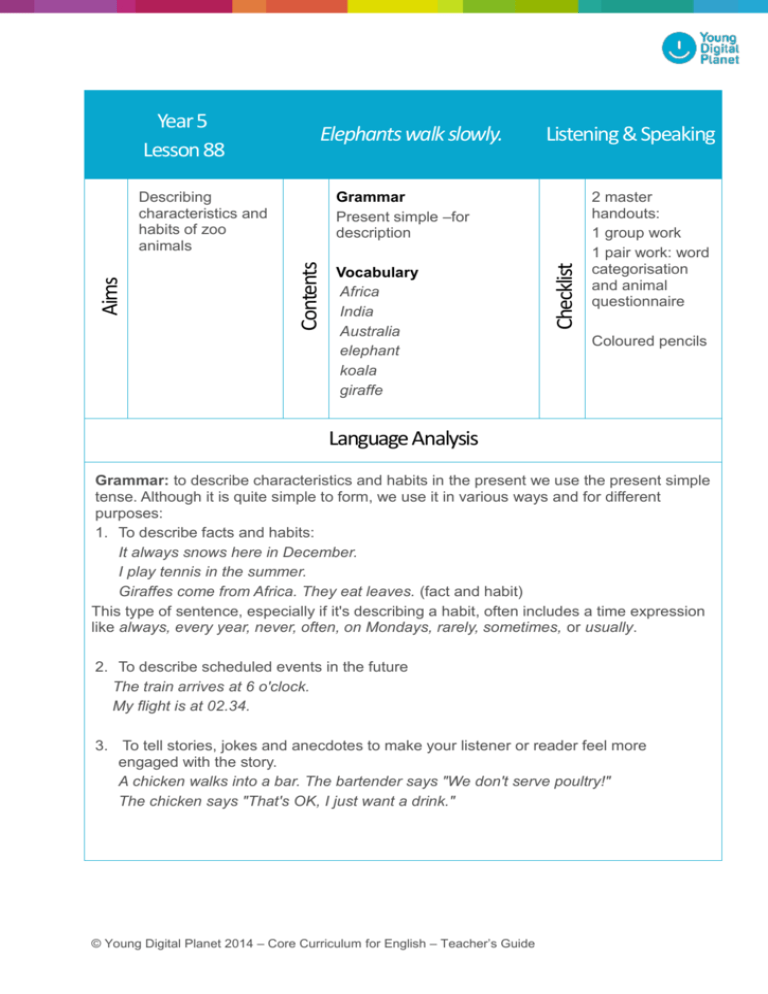
Elephants walk slowly. Grammar Present simple –for description Contents Aims Describing characteristics and habits of zoo animals Listening & Speaking Vocabulary Africa India Australia elephant koala giraffe Checklist Year 5 Lesson 88 2 master handouts: 1 group work 1 pair work: word categorisation and animal questionnaire Coloured pencils Language Analysis Grammar: to describe characteristics and habits in the present we use the present simple tense. Although it is quite simple to form, we use it in various ways and for different purposes: 1. To describe facts and habits: It always snows here in December. I play tennis in the summer. Giraffes come from Africa. They eat leaves. (fact and habit) This type of sentence, especially if it's describing a habit, often includes a time expression like always, every year, never, often, on Mondays, rarely, sometimes, or usually. 2. To describe scheduled events in the future The train arrives at 6 o'clock. My flight is at 02.34. 3. To tell stories, jokes and anecdotes to make your listener or reader feel more engaged with the story. A chicken walks into a bar. The bartender says "We don't serve poultry!" The chicken says "That's OK, I just want a drink." © Young Digital Planet 2014 – Core Curriculum for English – Teacher’s Guide Procedure Warm-up Off the screens 1. Check with students for the words they do not understand. 2. Give out Handout 1 and ask students to put the words in the categories. 3. Ask students to compare their answers in pairs. 4. Ask students to add their words to each category. 5. Nominate students to read out their categories. 6. Ask the other students if they can add any new words. 7. Continue until all students’ ideas have been read. Key: Noun: body part neck leg ears wings Noun: animal giraffe elephant penguin koala Noun: nature grass trees banana leaves Verb run walk jump fly Adjective slow tired lazy quiet © Young Digital Planet 2014 – Core Curriculum for English – Teacher’s Guide Adverb loudly quickly slowly quietly Screen 2 Zookeeper: Welcome to the zoo, class. Look over there. What’s that animal? Alex: An elephant. Zookeeper: Of course! What do you know about elephants? Lucy: Elephants with big ears come from Africa. Elephants with small ears come from India. Zookeeper: Great! What do they eat? Sam: Bananas? Zookeeper: Sometimes. Usually they eat grass, and they drink water. How do they walk? Kim: I think they walk slowly! They are very big! Zookeeper: Sometimes they can walk quickly, but usually they are quite slow animals. Do you know anything else about elephants? Alex: People put them in the circus. We saw some on TV! Zookeeper: That’s true. People like to watch elephants. Now, does anyone know the answer to this question. How many years do elephants live? Lucy: Ten years? Zookeeper: More than that. Some elephants can live for seventy years. They can also remember things for many years. Alex: Wow! Zookeeper: Let’s walk to the elephants. Bring your cameras. Come on! Exploit the scene by asking the Ss to describe what they can see. Then listen and watch the animation. Ask some questions to check understanding. © Young Digital Planet 2014 – Core Curriculum for English – Teacher’s Guide Screen 3 Zookeeper: Welcome to the zoo, class. Look over there. What’s that animal? Alex: An elephant. Zookeeper: Of course! What do you know about elephants? Lucy: Elephants with big ears come from Africa. Elephants with small ears come from India. Zookeeper: Great! What do they eat? Sam: Bananas? Zookeeper: Sometimes. Usually they eat grass, and they drink water. How do they walk? Kim: I think they walk slowly! They are very big! Zookeeper: Sometimes they can walk quickly, but usually they are quite slow animals. Do you know anything else about elephants? Alex: People put them in the circus. We saw some on TV! Zookeeper: That’s true. People like to watch elephants. Now, does anyone know the answer to this question. How many years do elephants live? Lucy: Ten years? Zookeeper: More than that. Some elephants can live for seventy years. They can also remember things for many years. Alex: Wow! Zookeeper: Let’s walk to the elephants. Bring your cameras. Come on! Key: 1T2F3T4T5F6T Additional activity 1 Ask students to correct the false sentences. 2. Nominate students to read out the answers. Key: 2 Elephants with small ears come from India. © Young Digital Planet 2014 – Core Curriculum for English – Teacher’s Guide 5 Some elephants can live for seventy years. 2. Ask students what other facts about elephants the zoo keeper mentions. 3. Nominate volunteers to answers, if students do not know ask them: What do elephants eat? Can they walk quickly? Key: possible answers: Elephants usually eat grass. They can walk quickly, but usually they are quite slow animals. Screen 4 Zookeeper: Our next animal is the koala bear. Can you see him? Alex: Yes, in the tree! Zookeeper: Good. Koala bears live in trees. What else do we know about koala bears? Lucy: They come from Australia! Zookeeper: Yes, that’s right. What do they eat? Kim: They live in trees, so I think they eat leaves. Zookeeper: Yes, good. There is another interesting thing. Koala bears are always tired. How many hours do you sleep every night? Lucy: Eight or nine. Zookeeper: Right. Koala bears sleep for twenty hours every day. Sam: Ooooh! I want to be a koala bear! Zookeeper: When we see the koalas, we must be quiet. Look – he’s asleep. Come on, let’s walk quietly. Key: 1 trees 2 Australia 3 leaves 4 tired 5 eight 6 twenty 7 asleep 8 quietly © Young Digital Planet 2014 – Core Curriculum for English – Teacher’s Guide Screen 5 Zookeeper: Our last animal is the giraffe. Tell me about giraffes. Kim: They are very tall! Zookeeper: Yes. They’ve got very long necks. The giraffe is taller than all the other animals in the world. Where do giraffes come from? Lucy: Giraffes come from Africa. Zookeeper: That’s right. What do they eat? Sam: Leaves. Zookeeper: Good! They eat leaves from tall trees. Can they run quickly? Alex: I think so. They’ve got long legs. Zookeeper: Yes, good. They can run very quickly. Some animals like to eat giraffes. They must run very quickly. Kim: They are very pretty. I love giraffes. Zookeeper: Me too. Come on, let’s go and see them. Key: 1 tall, necks 2 Africa 3 leaves, trees 4 quickly, legs 5 eat 6 pretty © Young Digital Planet 2014 – Core Curriculum for English – Teacher’s Guide Screen 6 Audio: Giraffes are very tall, with very long necks. Koala bears sleep twenty hours every day. Usually elephants eat grass and drink water. Give Ss instructions for the Look and say activity. 1. Look at the pictures and read the sentences. 2. Listen to the recording and repeat. 3. Now it’s your turn: work in pairs. Use the words on the right to talk about the animals. Additional activity – Handout 2 Imagine you are an animal and answer the following questions: Where do you live? How do you look? What can you do well? What can’t you do? / What do you do badly? What’s your favourite food? 1. Explain to students that they are going to imagine that they are their favourite animal and answer some questions which answers they will present to the class to guess their animal. 2. Give an example: I live in Antarctica. I am black and white with short legs. I can swim very well but I can’t walk quickly. I love eating fish. My worst enemy is a shark? 3. Elicit the answer from the students: a penguin. © Young Digital Planet 2014 – Core Curriculum for English – Teacher’s Guide 4. Give out Handout 2. 5. Allow five minutes for preparation and invite a volunteer to start. 6. The student who answers the animal first, presents their animal next. 7. Continue until all students have presented their animals. © Young Digital Planet 2014 – Core Curriculum for English – Teacher’s Guide Handout 1 grass loudly giraffe leg run walk quickly penguin jump koala Noun: body part Noun: animal slow slowly ears Noun: nature trees tired quiet Verb bananas fly lazy leaves wings quietly Adjective Handout 2 Imagine you are an animal and answer the following questions: Where do you live? How do you look? What can you do well? What can’t you do? / What do you do badly? What’s your favourite food? © Young Digital Planet 2014 – Core Curriculum for English – Teacher’s Guide neck elephant Adverb
